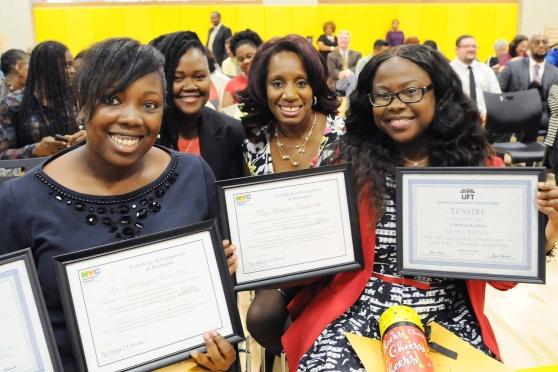
Achieving tenure is an important milestone in a teacher’s career. In this Q&A, probationary teachers can learn more about the benefits of tenure, becoming eligible and how to prepare for your tenure decision.
What is tenure and who is eligible to receive it?
Having tenure means you may not be disciplined or terminated without due process. As a tenured teacher, you have the right to a hearing before an independent arbitrator regarding any charges brought against you. These due process rights protect you from being fired for personal, arbitrary or political reasons.
Under New York State law, appointed teachers achieve tenure after completing a probationary period of usually four years and fulfilling all the requirements for a professional certificate. In New York City, tenure is granted in your license appointment area. Principals determine whether or not to make a tenure recommendation to the district superintendent, who officially grants tenure.
How do I achieve tenure?
First and foremost, you need to know your tenure date. To find it, check with your payroll secretary.
Achieving tenure is based on three milestones:
- Permanent or professional state certification: An individual must be appointed with a city license that matches their New York State Education Department permanent or professional certification. The school grade specified on the certification must also match the school level at which someone is appointed.
- Service evaluation: An individual’s service throughout the probationary period must demonstrate sustained effective performance. The DOE considers multiple measures to assess performance, including overall ratings. A teacher who is not rated Effective or higher for at least three years could have their probation extended for a year.
- Principal recommendation to complete probation: An individual must successfully complete their probationary period to their principal’s satisfaction before they can be considered for tenure by their superintendent.
Meeting these milestones makes an individual eligible for tenure, but it does not necessarily guarantee tenure.
How should I prepare for my tenure review? What are some best practices?
One principal’s criteria may be different from another’s, so be sure to arrange a meeting with your principal to discuss expectations and deadlines well in advance of your tenure date before you forge ahead.
In preparing for tenure, you’ll want to keep records and documents that reflect on your teaching performance, such as observation reports; positive communications to/from colleagues, mentor(s), supervisors, administrators, evaluators and/or parents; and evidence of your professional contributions to your school. Add a brief explanation or context for each piece of evidence you include, and be sure to show how you differentiate instruction to accommodate students with diverse abilities and language proficiencies. Include any work you have done for your school community, such as clubs, special events or projects, student groups you advise and activities in which you have participated.
There are many ways to organize this information — you can create a physical portfolio using binders or you can create a digital portfolio.
My principal wants to extend my probation and not give me tenure this year. Should I contact the UFT before signing off on the extension?
Untenured teachers whose principals want to extend their probations do not have to sign the extension of probation immediately. Members have a right to have one of the union’s lawyers look it over. In fact, every extension of probation should be submitted to the UFT for a NYSUT attorney to review before the member makes the decision to sign or not. If your principal is insisting that you sign an extension without time for the agreement to be reviewed, immediately contact your chapter leader, who will bring the matter to the attention of the UFT district representative or union borough office.
In a new provision that the union fought for and won in the 2023 DOE-UFT contract, a principal has to provide reasons, in writing, for the need to extend a UFT-represented teacher’s probationary period if a request for an explanation is submitted in writing. Principals can no longer extend someone’s probation without giving them any clue as to why.
What is the difference between achieving tenure and completion of probation?
In some cases, members will still be working under an initial or provisional certificate when they have completed the required probationary period and received a tenure recommendation from the principal and approval of the superintendent. However, tenure will not be granted until the professional or permanent certificate has been issued.
After completion of probation, the member cannot be disciplined or terminated without due process for reasons other than failure to complete the requirements for their professional certificate.
Is it possible to reduce my probationary period so I can achieve tenure sooner?
You may reduce your probation by one to two years if you meet the criteria for either of these scenarios:
Jarema credit: If you worked as a regular substitute under the same license and at the same school level, you can reduce your probationary period by up to two years.
Traveling tenure: If you received tenure in one license area and elected to take an appointment in a new license area, or if you were tenured in another school in New York State, you may be eligible to reduce your tenure by a year.
Records of this work and credits for service should be applied automatically, but it’s in your best interest to double check to make sure you received them.
In addition, if you were appointed and have already received tenure, but later teach under either a physical education, ENL, bilingual extension, library and media specialist, performing arts/drama, or special education certification, your probationary period will be reduced to one year. Read more »
See the Know Your Rights section of the UFT website for more information about achieving tenure.